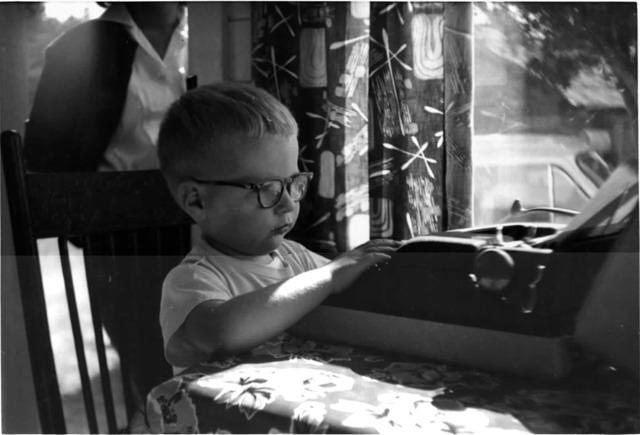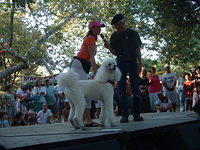69
Comments
-
harold@hallikainen.com
Harold starts his writing career! Beverly High tells me that that's
me (I was afraid of that) at the typewriter with her in the background.
She also says the picture was taken in Fort Bragg (California).
Though I don't recall that typewriter, I do remember playing with
typewriters while in elementary school. I had one typewriter where
the carriage would not advances, so I instead rolled the paper up
after each character, printing sentences vertically. I also remember
playing with the ditto or spirit duplicator process with typewriters
in elementary school. Remember how ditto school papers (often tests)
smelled? That was the alcohol used to transfer the ink from the master
to the copies. I used to raid the trash cans at school to find the
carbon paper off the back of the ditto master. I'd put another piece of
paper on the front and type on it (sometimes vertically...). I'd then
take my master copy, which had the ditto ink on the back backwards,
and roll it and a blank piece of paper through the typewriter with
the blank piece against the roller of the typewriter. As these were
rolled through, I'd brush alcohol onto the roller of the typewriter. The
alcohol would soak through the blank paper and pick up ink from the
master. Once this was rolled through, out came a perfect purple
copy! Almost as fast as Guttenberg's press! One teacher got upset
when she found that I was collecting the carbons from ditto masters
since the material typed on the master was often quite readable on
the carbon. She was sure I was getting a copy of a test ahead of
time... So, I had an early start at typing. And, today, I'm still
typing!
Harold -
harold@hallikainen.com
You're right! I had a long history in printing! First, there was a rubber stamp set from the basement in Berkeley. Then there was a mimeograph machine for printing post cards. It was a little table top unit with a crank on the side. The ink got EVERYWHERE! There was my use of the typewriter as the ditto machine (as described above). Then a Multilith model 80 offset press. The paper feeder on it never worked right, so I had to feed paper into it one sheet at a time. Paper masters could be typed on with a special typewriter ribbon, or metal photo plates could be used. I found a print shop in Lafayette that would make film negatives of stuff I took in there (both typewritten and half-tone photographs). I'd then "strip" those into a masking sheet and expose a plate through the masking sheet and negatives. The plates were exposed by putting them on a table, putting the masking sheet with negatives on top of it, the safety glass out of an old TV on top of that. A sun lamp would then be run for about 10 minutes to expose the plate with UV. The plate was developed with some purple laquer stuff. It was then put on the press and several thousand copies could be run! I later moved to a Multilith 1250 offset press. The paper feeder on it used a vacuum. It worked really well. The output side had a chain that carried the pages until it dropped them straight down onto the output platform. This gave the ink more time to dry and prevented sheets from sliding over each other, smearing the ink. I later moved these presses to San Luis Obispo. For a while, the model 80 was in the very small transmitter building for KSLY, the 250 watt AM station I worked for. It's amazing that the fumes from the plate developer didn't make the building explode.
HH -
I also remember Harold having a mimeograph machine or something like it)in the
garage at Orinda. I think he put out some neighborhood newsletter.

